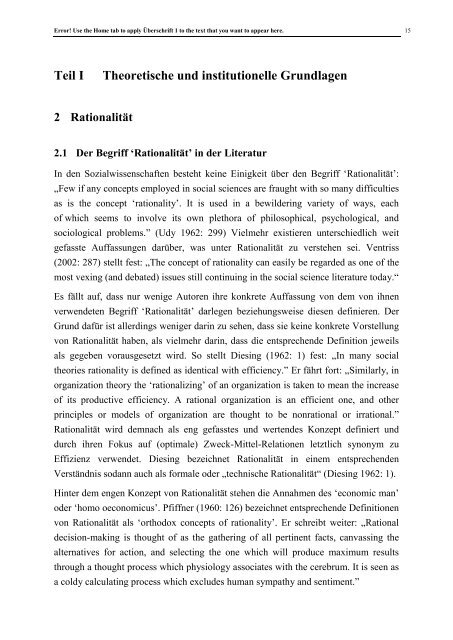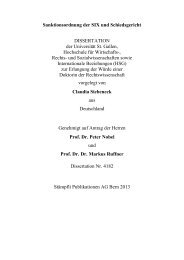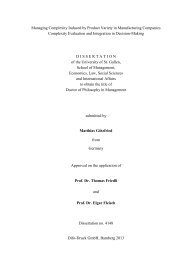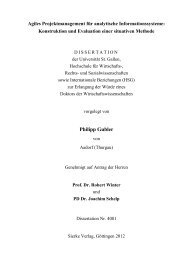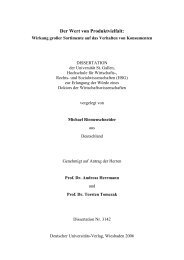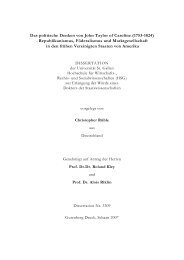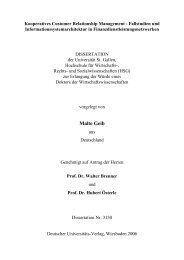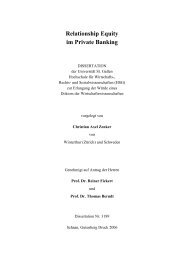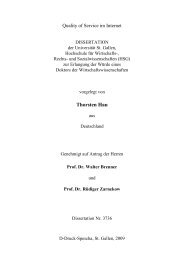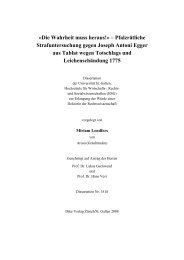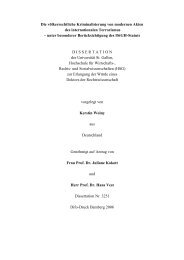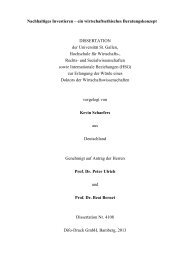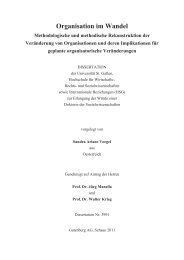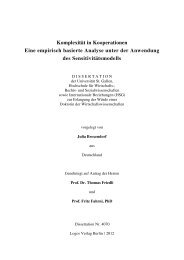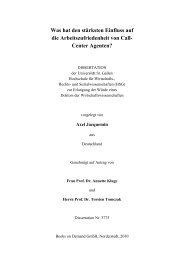Multiple Rationalitäten der kantonalen ... - Universität St.Gallen
Multiple Rationalitäten der kantonalen ... - Universität St.Gallen
Multiple Rationalitäten der kantonalen ... - Universität St.Gallen
Erfolgreiche ePaper selbst erstellen
Machen Sie aus Ihren PDF Publikationen ein blätterbares Flipbook mit unserer einzigartigen Google optimierten e-Paper Software.
Error! Use the Home tab to apply Überschrift 1 to the text that you want to appear here. 15<br />
Teil I<br />
Theoretische und institutionelle Grundlagen<br />
2 Rationalität<br />
2.1 Der Begriff ʻRationalitätʼ in <strong>der</strong> Literatur<br />
In den Sozialwissenschaften besteht keine Einigkeit über den Begriff ‘Rationalität’:<br />
„Few if any concepts employed in social sciences are fraught with so many difficulties<br />
as is the concept ‘rationality’. It is used in a bewil<strong>der</strong>ing variety of ways, each<br />
of which seems to involve its own plethora of philosophical, psychological, and<br />
sociological problems.” (Udy 1962: 299) Vielmehr existieren unterschiedlich weit<br />
gefasste Auffassungen darüber, was unter Rationalität zu verstehen sei. Ventriss<br />
(2002: 287) stellt fest: „The concept of rationality can easily be regarded as one of the<br />
most vexing (and debated) issues still continuing in the social science literature today.“<br />
Es fällt auf, dass nur wenige Autoren ihre konkrete Auffassung von dem von ihnen<br />
verwendeten Begriff ‘Rationalität’ darlegen beziehungsweise diesen definieren. Der<br />
Grund dafür ist allerdings weniger darin zu sehen, dass sie keine konkrete Vorstellung<br />
von Rationalität haben, als vielmehr darin, dass die entsprechende Definition jeweils<br />
als gegeben vorausgesetzt wird. So stellt Diesing (1962: 1) fest: „In many social<br />
theories rationality is defined as identical with efficiency.” Er fährt fort: „Similarly, in<br />
organization theory the ‘rationalizing’ of an organization is taken to mean the increase<br />
of its productive efficiency. A rational organization is an efficient one, and other<br />
principles or models of organization are thought to be nonrational or irrational.”<br />
Rationalität wird demnach als eng gefasstes und wertendes Konzept definiert und<br />
durch ihren Fokus auf (optimale) Zweck-Mittel-Relationen letztlich synonym zu<br />
Effizienz verwendet. Diesing bezeichnet Rationalität in einem entsprechenden<br />
Verständnis sodann auch als formale o<strong>der</strong> „technische Rationalität“ (Diesing 1962: 1).<br />
Hinter dem engen Konzept von Rationalität stehen die Annahmen des ʻeconomic manʼ<br />
o<strong>der</strong> ʻhomo oeconomicusʼ. Pfiffner (1960: 126) bezeichnet entsprechende Definitionen<br />
von Rationalität als ʻorthodox concepts of rationalityʼ. Er schreibt weiter: „Rational<br />
decision-making is thought of as the gathering of all pertinent facts, canvassing the<br />
alternatives for action, and selecting the one which will produce maximum results<br />
through a thought process which physiology associates with the cerebrum. It is seen as<br />
a coldy calculating process which excludes human sympathy and sentiment.”


